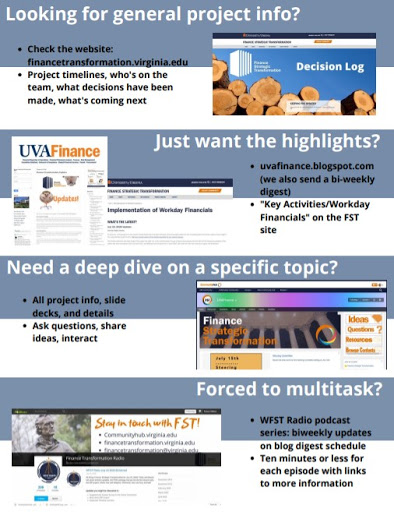Want to listen to this update instead of reading it? Tune into this week's WFST Radio Broadcast!
The Functional Team are creating configuration workbooks
and user stories to support the development of the initial UVA Workday Financials
tenant for the Configure and Prototype stage, which begins in November and runs
roughly through March of 2021.
As a part of the
Configuration & Prototype stage, the UVA community will have at least two
rounds of validating the tenant (maybe even three if time allows). These cycles involve the team building the Workday
Financials tenant with UVA data inside, then users getting time to try the
tenant out, validating data. Based on
their feedback, the team will tweak the system and return with a new version of
the tenant. (See more by viewing the timeline.)
Remember our house-building metaphor? The configuration and prototype
phase is like when the builders frame up your house from the blueprint,
and you get to walk through and make sure everything is as you thought it would
be, making changes where they’re needed now that you can see it put together. Basically, in Configuration and Prototype, we all
come together to make sure we’re building a financial system that will work
well for us at UVA.
Plan now to stay in the know! Configuration & Prototype is a time where we all need to be paying close attention. As autumn progresses, we’ll all need to make
a commitment to staying tuned to news from the FST Team and being engaged in meetings. Take a look at the FST communication channels, find one or two that work for you, and bookmark
them!
The System Remediation team engaged with University Physician’s group
stakeholders to develop requirements for their enterprise resource planning,
Epicor’s system remediation.
The Adaptive Budget team is helping units finalize the
FY2021 revised budget submissions, continuing development work in preparation
for the FY 2022 budget development process, planning for long-term deployment,
and collaborating on remediation with Workday and the FDM.
The Technical
team continues to work on the high-level data conversion timeline and planning
for the configuration and prototype stage.
They’re working on a tactical-level plan for the initial UVA Workday
tenant, and continuing discovery on system integrations.
The Reporting
team is conducting analysis of user stories for the Business Assets Functional
area. They’ve met with the financial
accounting, payroll costing, and grants management teams to discuss collection
of high-level reporting requirements and user stories.
FST Website Resources: To make it easier for you to keep up with the workstream outputs, we’ve given each workstream a page on the FST website, and we’ll
be updating them regularly with whatever the team is currently doing.
While you’re on the FST website, by the way, check
out the resources we’ve made available to help keep you in the know, including
the Decision Log, which we update continually, and the Workday Words dictionary, which is now searchable!
Many of you are very interested in what's going on with the FDM, or Foundation Data Model, as we head toward Configuration & Prototype. Check out this blog post for three ways to keep your finger on the FDM pulse.
Continuous Improvement: FST is more than just a system implementation. Don’t forget to
keep up with the Continuous Improvement content to be found on the UVAFinance
blog (you can search for it by keyword in the search box, or you can simply
click on "continuous improvement" on the right-hand side of the blog). There’s also
a space in the Online Community devoted to continuous improvement content –
there are lots of helpful tools, examples, and even video content.































